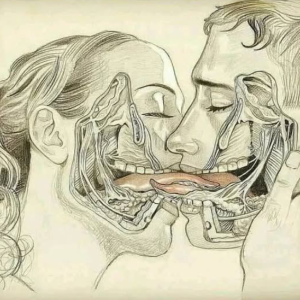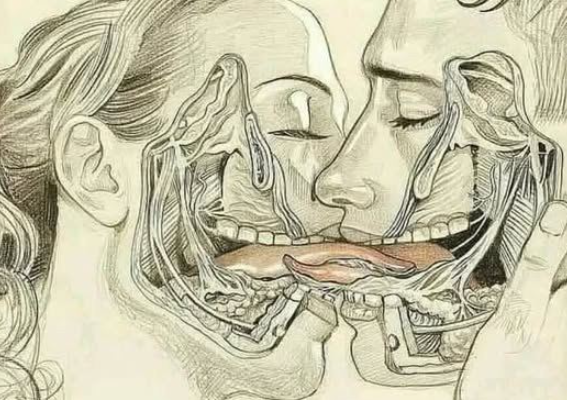
When two people lean in close and share a tongue kiss—commonly known as French kissing—it becomes much more than a romantic gesture. It is an intimate act that mixes biology, psychology, and emotion all at once. Though people often think of it simply as passion or romance, tongue kissing triggers a series of fascinating reactions in the body and mind. It connects partners on a deeper level, sparks chemistry, and even has health implications that many don’t realize. Let’s explore what really happens when we tongue kiss.
The Science Behind the Kiss
At first contact, lips meet lips. Our lips are among the most sensitive areas of the human body, containing thousands of nerve endings. When tongues come into play, that sensitivity multiplies. The brain registers these signals through the release of neurotransmitters like dopamine and serotonin, the chemicals associated with pleasure and bonding. In essence, the kiss sends a message straight to the reward centers of the brain.
Tongue kissing also involves the exchange of saliva. While this might sound unromantic, saliva carries hormones, pheromones, and subtle biological signals that our bodies can interpret without us even knowing. These signals can influence attraction and compatibility on a subconscious level. Some scientists suggest that kissing helps people subconsciously test for genetic compatibility, particularly in regard to immune system diversity.
Emotional Connection
Beyond biology, tongue kissing deepens emotional intimacy. It creates a space where two people share vulnerability, closeness, and desire. Psychologists say kissing acts as a bonding ritual, reinforcing trust and affection between partners. For couples, it can reignite passion, reminding them of their connection. For those experiencing it for the first time, it can feel both thrilling and nerve-wracking, marking an important milestone in a relationship.
This emotional weight explains why people often remember their first kiss vividly, years later. The brain ties the act of kissing with strong emotional memory, making it a lasting impression of intimacy and closeness.
The Physical Reactions
When tongues meet, the body reacts in several noticeable ways. Heart rate increases, breathing quickens, and pupils dilate. Blood vessels widen, creating a sense of warmth throughout the body. Some people feel a rush of energy, while others experience a calming wave of relaxation afterward.
Hormones play a major role here. Oxytocin, known as the “love hormone,” surges during passionate kissing, encouraging bonding and feelings of trust. At the same time, adrenaline and dopamine add excitement, making the moment feel exhilarating and addictive. It’s no wonder that a single kiss can leave people feeling euphoric or longing for more.
Health Benefits of Tongue Kissing
Surprisingly, tongue kissing can offer health perks. The exchange of small amounts of bacteria actually helps strengthen the immune system. Just like exposure to new environments trains the body to fight infections, exposure to a partner’s microbiome can boost resistance.
Kissing also lowers stress by reducing cortisol levels in the body. Couples who kiss often report lower anxiety and better moods. The physical act of pressing lips together stimulates facial muscles, and though minor, it can even have small benefits for circulation and skin health.
The Psychological Impact
Kissing is not just physical—it’s deeply psychological. When partners engage in tongue kissing, they build trust and reassurance. It affirms attraction, loyalty, and mutual desire. A passionate kiss can strengthen relationships by reminding partners of their chemistry. On the flip side, an unsatisfying kiss can sometimes reveal a lack of compatibility, leaving people questioning the relationship.
Researchers have found that kissing plays a stronger role in human bonding than even sexual activity alone. For many, it’s the gateway to deeper intimacy, acting as a test of emotional and physical harmony.
Cultural Meanings
Not every culture places the same emphasis on tongue kissing. In some societies, it is considered essential for romantic relationships, while in others, it is rare or even taboo. This shows that while the biological effects are universal, the social meaning is shaped by traditions, norms, and values.
In modern global culture, French kissing has become a symbol of passion. Films, music, and media often depict it as the ultimate romantic gesture, reinforcing its role as more than just a physical act but a cultural emblem of love.
The Risks
Like any intimate act, tongue kissing also carries risks. The exchange of saliva can transmit colds, flu, and other infections, including mononucleosis, often called the “kissing disease.” This is why health professionals caution against kissing when sick. While generally safe for healthy individuals, it’s worth remembering that the intimacy of tongue kissing involves exposure to another person’s bacteria and viruses.
Why It Feels So Powerful
The power of tongue kissing lies in its ability to engage the body on multiple levels—sensory, chemical, emotional, and psychological—all at once. Few other acts combine so many layers of connection. It excites the brain, bonds partners emotionally, tests biological compatibility, and even offers health benefits.
Every kiss is also unique. The way partners kiss—slow and gentle, fast and passionate, playful or intense—creates different meanings and sensations. This uniqueness is part of what makes tongue kissing so personal and memorable.
The Lasting Impact
Couples who make kissing a regular part of their relationship report higher levels of satisfaction. It maintains intimacy, fosters connection, and often strengthens long-term commitment. Even after years together, a passionate kiss can reignite sparks and bring back memories of early romance.
At its core, tongue kissing is a form of communication. It says things words cannot—desire, affection, commitment, longing. It bypasses language, speaking directly through sensation and emotion.
Conclusion
When we tongue kiss, we are not just pressing lips and sharing breath. We are engaging in one of humanity’s most intimate rituals, one that links biology with emotion, health with passion, and mystery with connection. It’s an act that can spark attraction, build relationships, and even reveal whether two people are truly in sync.
Whether it’s a first kiss that sends shivers down the spine or a kiss years into a relationship that reminds partners of their bond, the act of French kissing holds a power far greater than its simplicity suggests. It is both science and art, instinct and culture, pleasure and meaning.
So the next time two people lean closer and share a tongue kiss, they’re not just kissing—they’re igniting a complex dance of chemistry, emotion, and memory that reminds us why this small act has fascinated humanity for centuries.

